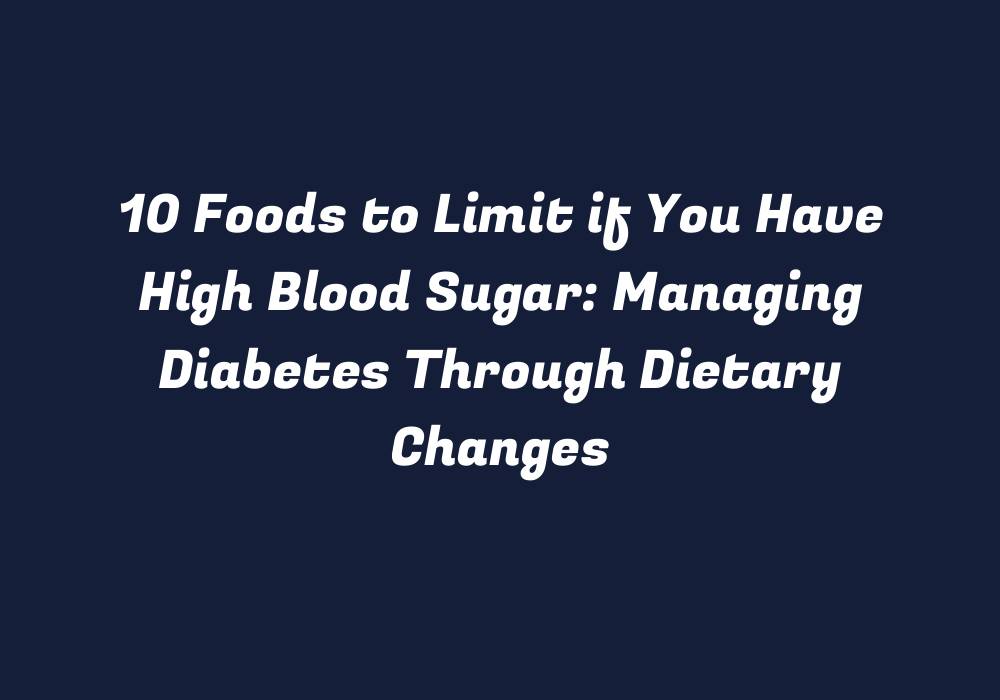Managing Diabetes Through Dietary Changes: 10 Foods to Limit if You Have High Blood Sugar
Introduction
Diabetes is a widespread health condition that affects millions of people around the world. It occurs when your blood sugar, or glucose levels, are too high, either because the body cannot produce enough insulin or cells do not respond well to it. As a result, managing diabetes becomes crucial for maintaining overall health and well-being.
One of the essential aspects of managing diabetes is understanding which foods can help regulate blood sugar levels and which should be limited in your diet. In this article, we will discuss ten such foods that you may want to consider limiting if you are among those with high blood sugar or diabetes.
1. Refined Grains
Refined grains are a common staple food item in many diets. They are typically found in breads, pastries, white rice, and cereals. However, refined grains have little nutritional value due to the removal of bran and germ during processing. Consumption of these foods can cause rapid spikes in blood sugar levels, leading to increased insulin resistance and poor control over glucose levels.
2. Sugar-sweetened Beverages
Sugar-sweetened beverages are a primary source of added sugars and empty calories in the average person’s diet. They include soda, energy drinks, sports drinks, and sweet tea. Consuming too many of these can lead to significant increases in blood sugar levels. Therefore, it is advisable to limit your intake of such beverages or opt for healthier alternatives like water or unsweetened herbal teas.
3. Sweetened Dairy Products
While dairy products have numerous nutritional benefits, those containing added sugars can significantly affect blood sugar levels. Examples include flavored yogurts, sweetened milks, and certain cheeses with high sugar content. It is essential to read nutrition labels carefully to identify which types of dairy are more suitable for people managing diabetes.
4. Fried Foods
Fried foods, like French fries, onion rings, or fried chicken, often contain a lot of unhealthy fats and oils. Consuming such foods can lead to rapid increases in blood sugar levels due to the release of triglycerides that can interfere with insulin sensitivity. It is advisable to limit your intake of these dishes and opt for healthier alternatives like baked or grilled options when possible.
5. White Potatoes
Potatoes are a versatile source of carbohydrates, but the glycemic index of white potatoes can be relatively high. This means that they have the potential to cause sudden spikes in blood sugar levels. If you choose to include potatoes in your diet, it is crucial to consume them with healthy fats and proteins to help slow down the rate at which carbohydrates are absorbed into the bloodstream.
6. Pastries and Desserts
Desserts such as cakes, cookies, ice cream, and pastries are notorious for their high sugar content. Although they provide momentary pleasure, consuming too many of these foods can contribute to weight gain and further complicate diabetes management. When managing diabetes, it is essential to limit or avoid these desserts entirely unless you can find a suitable healthier alternative like low-sugar options or baked goods made with whole grains and natural sweeteners.
7. Alcoholic Beverages
Although some types of alcoholic beverages contain antioxidants and may have a neutral effect on blood sugar levels, many are high in calories and can lead to weight gain, which is not ideal for diabetes management. Some drinks, such as sweetened mixed drinks or cocktails, may also contain a lot of added sugars that can contribute to spikes in blood sugar levels. Therefore, it is essential to monitor your intake and opt for low-sugar alternatives if you do decide to drink alcohol.
8. Sugary Fruits
Although fruits are generally considered healthy choices due to their fiber content and numerous nutrients, some contain high amounts of natural sugars. Examples include mangoes, grapes, bananas, and watermelon. While these fruits should not be entirely avoided in a diabetes-friendly diet, it is essential to limit your consumption and opt for lower sugar options like berries or citrus fruits.
9. Processed Meats
Processed meats often contain high levels of sodium and preservatives which can lead to increased blood pressure and poor heart health. Additionally, some processed meats may be high in saturated fats, making them a less desirable choice for people with diabetes who should focus on maintaining healthy cholesterol levels. Instead, opt for leaner protein choices like poultry or fish.
10. Refined Oils
While oils are a necessary part of any diet, some refined oils undergo processing that strips them of their beneficial nutrients. This can cause rapid spikes in blood sugar levels when consumed in excess. It is crucial to choose healthier oil options like extra virgin olive oil or avocado oil instead of highly processed vegetable and seed oils.
Conclusion
Managing diabetes through dietary changes plays a vital role in overall health. By limiting the consumption of certain foods, you can effectively regulate blood sugar levels and maintain better control over your diabetes. By focusing on whole, nutrient-dense foods that provide sustained energy without causing spikes or crashes in glucose levels, you are taking an important step toward a healthier and more balanced diet.
